英语九年级全一册Unit 13 SectionA GrammarFocus-4c课件(共有35张ppt)
文档属性
| 名称 | 英语九年级全一册Unit 13 SectionA GrammarFocus-4c课件(共有35张ppt) | 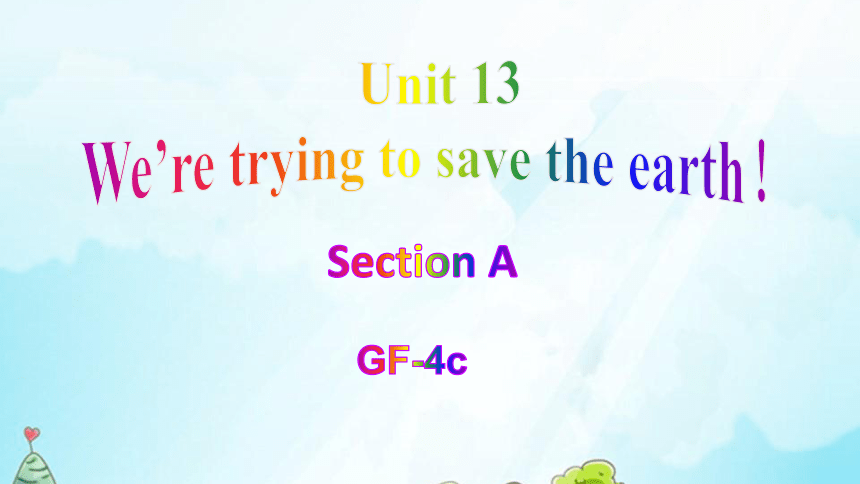 | |
| 格式 | pptx | ||
| 文件大小 | 360.8KB | ||
| 资源类型 | 教案 | ||
| 版本资源 | 人教新目标(Go for it)版 | ||
| 科目 | 英语 | ||
| 更新时间 | 2022-01-11 11:14:14 | ||
图片预览

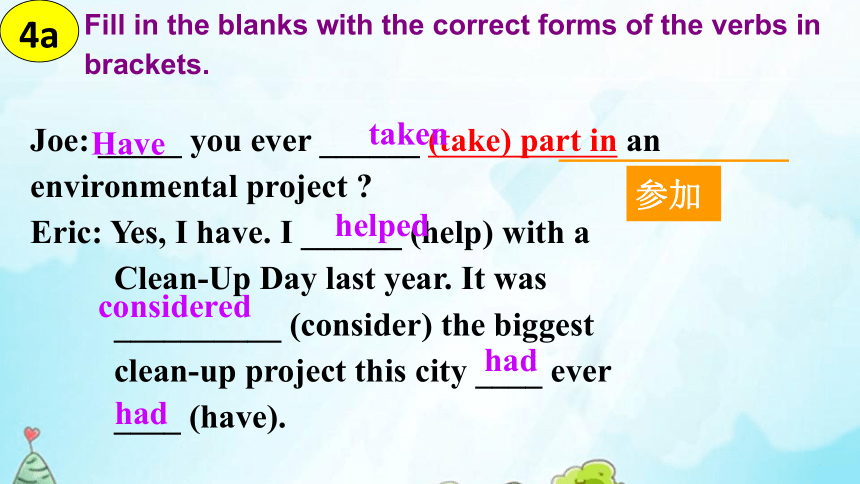
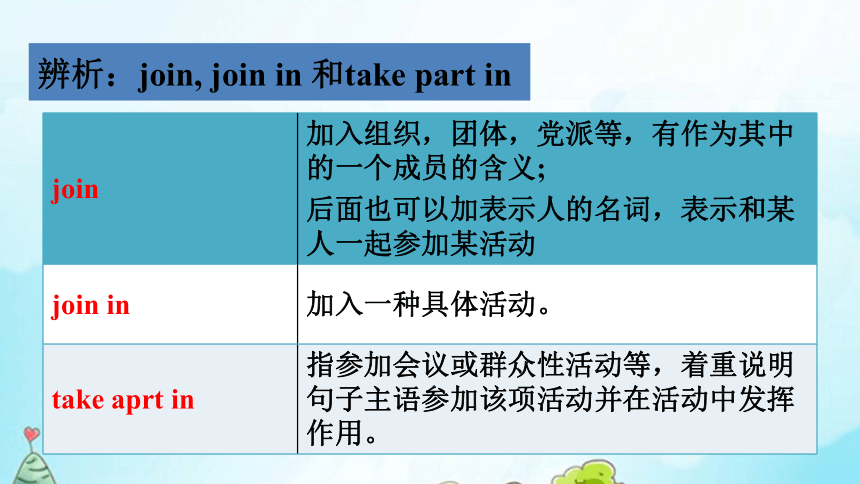
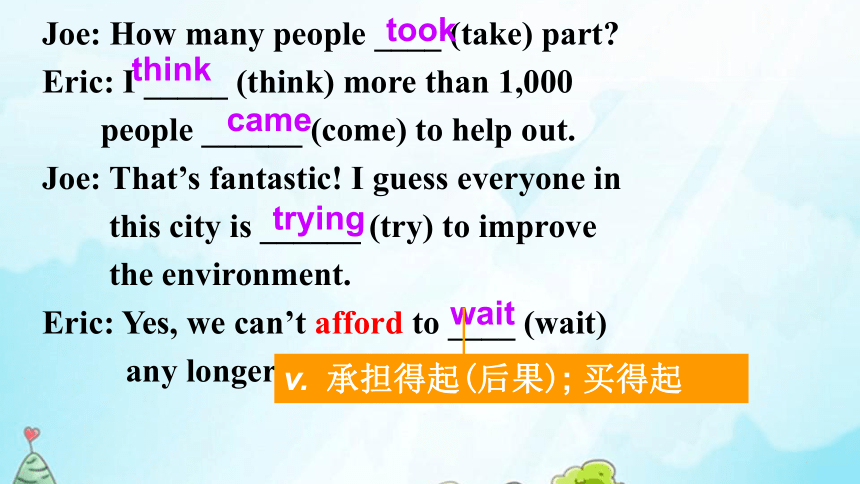
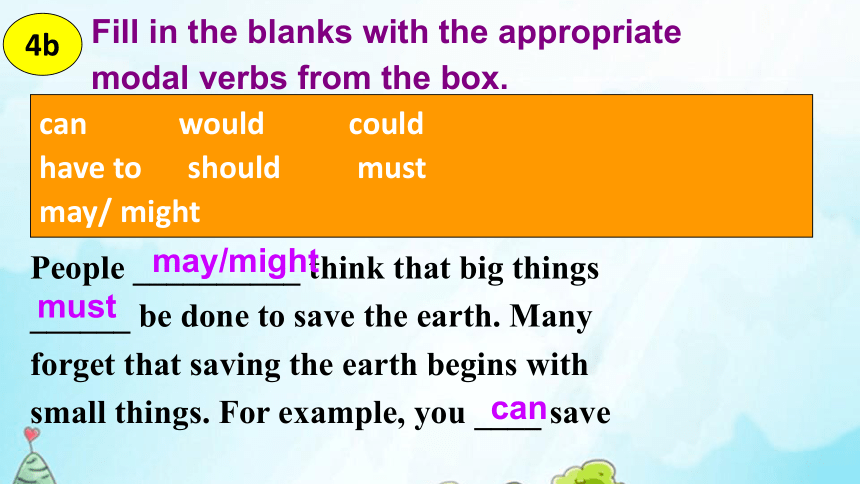

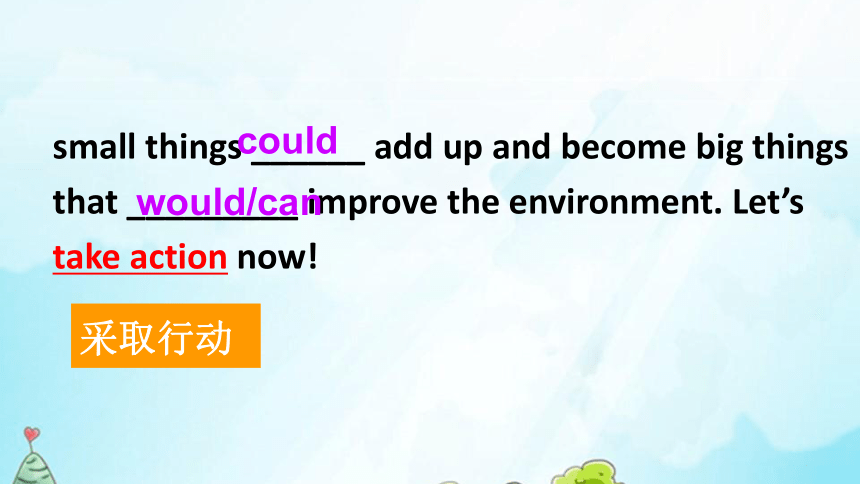
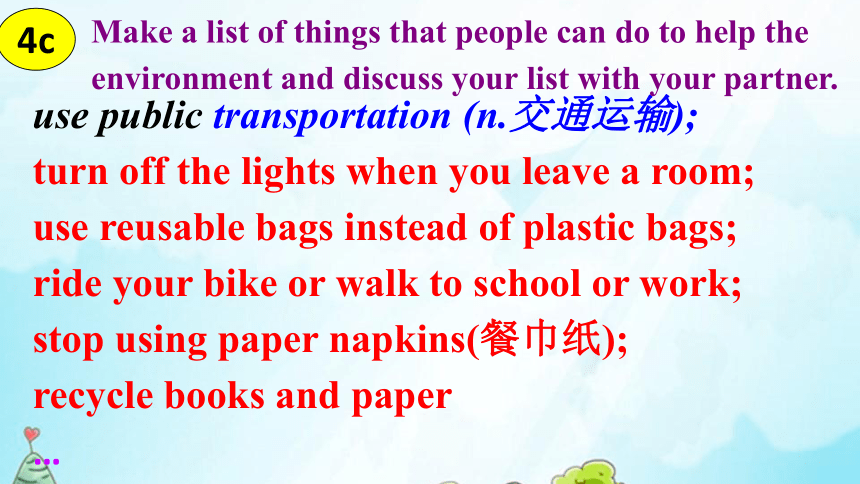
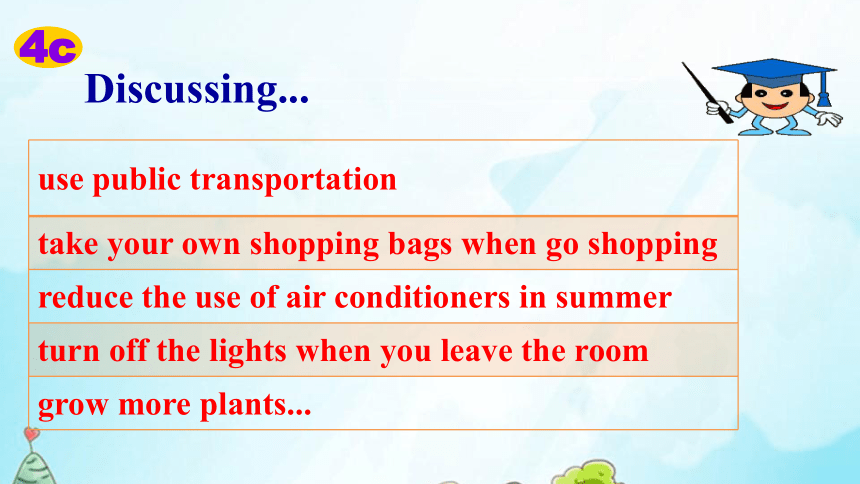
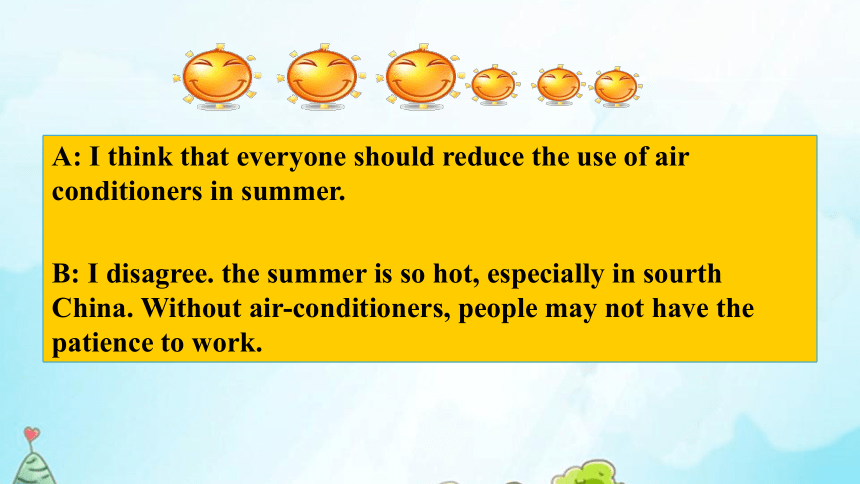
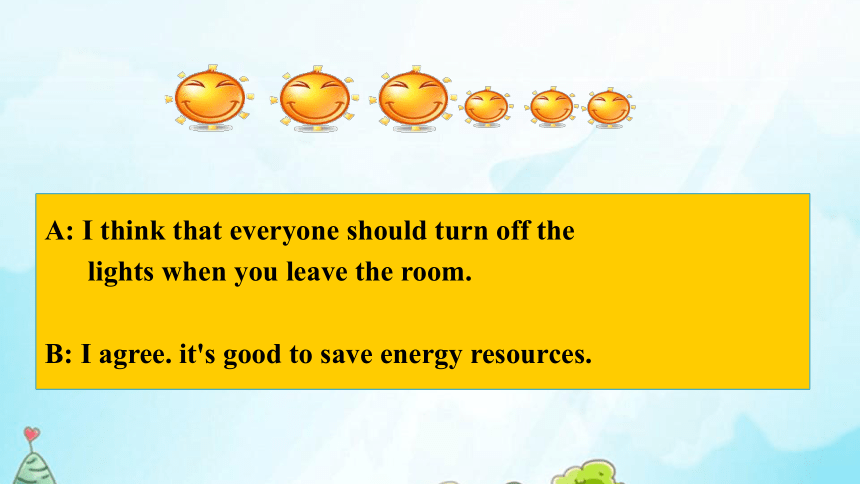
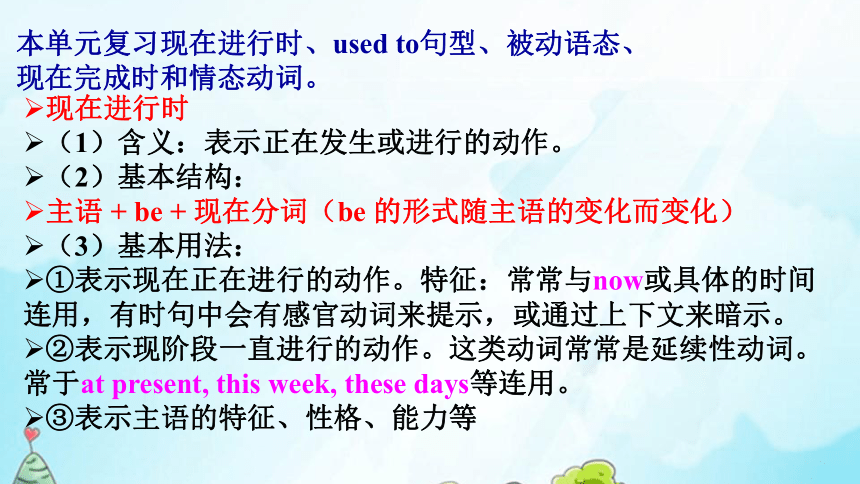
文档简介
(共35张PPT)
Section A
GF-4c
Unit 13
We’re trying to save the earth!
4a
Fill in the blanks with the correct forms of the verbs in brackets.
Joe: _____ you ever ______ (take) part in an environmental project
Eric: Yes, I have. I ______ (help) with a
Clean-Up Day last year. It was
__________ (consider) the biggest
clean-up project this city ____ ever
____ (have).
Have
taken
helped
considered
had
had
参加
辨析:join, join in 和take part in
to
join 加入组织,团体,党派等,有作为其中的一个成员的含义;
后面也可以加表示人的名词,表示和某人一起参加某活动
join in 加入一种具体活动。
take aprt in 指参加会议或群众性活动等,着重说明句子主语参加该项活动并在活动中发挥作用。
Joe: How many people ____ (take) part
Eric: I _____ (think) more than 1,000
people ______ (come) to help out.
Joe: That’s fantastic! I guess everyone in
this city is ______ (try) to improve
the environment.
Eric: Yes, we can’t afford to ____ (wait)
any longer to take action!
took
think
came
trying
wait
v. 承担得起(后果); 买得起
4b
Fill in the blanks with the appropriate
modal verbs from the box.
People __________ think that big things
______ be done to save the earth. Many
forget that saving the earth begins with
small things. For example, you ____ save
may/might
must
can
can would could
have to should must
may/ might
electricity by turning off the lights when you leave a room. You ______ also use
reusable bags instead of plastic bags. I think it’s a great idea that you now ______ pay for plastic bags in some stores. And instead of driving to school or work, you __________ ride your bike or walk. If it’s far, you __________ take the bus. All these
could
have to
can/should
can/could
关掉
adj.可重复使用的
付费;付出代价
small things ______ add up and become big things that _________ improve the environment. Let’s take action now!
could
would/can
采取行动
4c
Make a list of things that people can do to help the environment and discuss your list with your partner.
use public transportation (n.交通运输);
turn off the lights when you leave a room;
use reusable bags instead of plastic bags;
ride your bike or walk to school or work;
stop using paper napkins(餐巾纸);
recycle books and paper
…
Discussing...
4c
use public transportation
take your own shopping bags when go shopping
reduce the use of air conditioners in summer
turn off the lights when you leave the room
grow more plants...
A: I think that everyone should reduce the use of air conditioners in summer.
B: I disagree. the summer is so hot, especially in sourth China. Without air-conditioners, people may not have the patience to work.
A: I think that everyone should turn off the
lights when you leave the room.
B: I agree. it's good to save energy resources.
现在进行时
(1)含义:表示正在发生或进行的动作。
(2)基本结构:
主语 + be + 现在分词(be 的形式随主语的变化而变化)
(3)基本用法:
①表示现在正在进行的动作。特征:常常与now或具体的时间连用,有时句中会有感官动词来提示,或通过上下文来暗示。
②表示现阶段一直进行的动作。这类动词常常是延续性动词。常于at present, this week, these days等连用。
③表示主语的特征、性格、能力等
本单元复习现在进行时、used to句型、被动语态、
现在完成时和情态动词。
1. Don't make so much noise. The
children _______ an English lesson.
A. have B. are having C. were having
2. Listen! The phone ______. Please go to
answer it.
A. rings B. is ringing
C. rang D. will ring
现在完成时
(1)含义:表示过去发生的动作对现在还有影响。
(2)基本结构:主语 + have / has + 过去分词
(3)基本用法:
①表示过去发生的动作,但强调对现在产生影响。特征:不能与表示具体的时间状语连用。
②表示过去发生的动作或存在的状态一直延续到现在,还可能继续下去。常常与since, for, in the past + 时间名词,in the last +时间名词等时间状语连用,而且谓语动词要求是延续性动词。
③表示一种“经历或体验”,即可以表示经历过也可以是从来都没有经历过。
3. --- Why won’t you go to the movie with
me, Gina
--- Because I ______ it twice.
A. see B. have seen
C. saw D. will see
4. — China develops so fast.
— That’s true. It ______ a lot already.
A. changes B. changed
C. will change D. has changed
被动语态
初中阶段我们学习了七种被动结构,归纳如下:
(1)一般现在时是被动语态:am / is / are + 过去分词
(2)现在完成时的被动式:
have / has + been + 过去分词
(3)现在进行时的被动式:
am/ is/ are + being + 过去分词
(4)一般过去时的被动式:was / were + 过去分词
被动语态
(5)过去进行时的被动式:
was / were + being + 过去分词
(6)过去完成时的被动式:had + been + 过去分词
(7)一般将来时的被动式:
will / be going to be+ 过去分词
(8)含有情态动词的被动式:
情态动词+be +动词的过去分词。
5. Nick _______ a job in a bank, but to
our surprise, he didn’t take it.
A. offered B. has offered C. was offered
6. — Have you heard of Earth Day
— Yes. The first Earth Day _______
in 1970 to educate us to protect our planet.
A. celebrates B. celebrated
C. is celebrated D. was celebrated
情态动词
情态动词表示说话人对某一动作或状态的态度,如认为“可能”、“应当”、“必要”等。情态动词本身有一定的意义,但不能单独作谓语,也没有人称和数的变化。后面一般跟动词原形。
used to 结构
used to意为“过去常常做某事”,指的是过去的习惯性动作,目的在于与现在形成对照。used to是个情态动词,其中的to是不定式符号,后面跟动词原形。在美式英语中。它的疑问式是:Did +主语+use to do sth.?否定式是:主语+didn't use..。在英式英语中,它的疑问式应当是:Used +主语+to sth.?否定式应当是used not to或use(d)n't to。
He used to stay up late. 他过去常熬到很晚。
7. — Excuse me, whose book is this
— It ______ be John’s. It has his name on it.
A. must B. need C. can’t
8. — ______ I swim here
— No, you ______. Look at the sign “No swimming”.
A. Must; can’t B. Can; don’t C. Can; mustn’t
used to 结构
used to意为“过去常常做某事”,指的是过去的习惯性动作,目的在于与现在形成对照。used to是个情态动词,其中的to是不定式符号,后面跟动词原形。
在美式英语中:
它的疑问式是:Did +主语+use to do sth.
否定式是:主语+didn't use.
在英式英语中:
它的疑问式应当是:Used +主语+to sth.
否定式应当是used not to.
1. We can’t afford to wait any longer to take action!
afford v. 承担得起;买得起;提供, 给予
常与can, be able to连用
afford sth. 买得起/承受得起某物
afford to do sth. 有能力做某事/负担得起做某事
e.g. Can you afford the mobile phone
We can’t afford to pay such a price.
Language points
afford & buy
afford侧重“有经济能力买”,而buy则侧重“购买(这一行为)”。
表示“我买不起……”可以说I can’t afford ...,但不能说I can’t buy ...。
根据句意,用afford或buy的适当形式填空。
1) They can’t ________ to send their children to college.
2) Can you ________ a new car
3) Helen ________ some fruit on her way home yesterday.
afford
afford
buy
2. …save electricity by turning off the lights when you leave a room.
turn off 关掉
e.g. Please turn the television off before you go to bed.
睡觉前请关掉电视。
turn on 打开, 发动 turn around 转身
turn up 调高(音量) turn down 调低; 拒绝
turn into 变成; 进入 turn over 移交
拓展: turn相关短语
我都 学会了!
本课句型
Summary
1.I don't have enough money to ________ ________ (为……付费) these books.
2.Be sure to ______ ______ (关掉) the lights when you go out.
3.The government ________ ________ (采取行动) to help the people in the train accident last week.
4.Lily doesn't ________ ________ ________ (参加) any of the after-class activities.
5.They walked home last night because they couldn't ________ to take a taxi.
A.leave B.buy C.afford D.allow
pay for
turn off
took action
take part in
C
Exercises
Complete the following sentences.
I _________ (be) in Beijing for two years.
2. I _____ never _____ (hear) of that
man before.
3. Tom __________ (work) there since
two years ago.
have been
have
heard
has worked
Exercise
4. The twins ___________ (wash) the clothes for an hour.
5. He _________ (play) basketball since three years ago.
6. How long ____ Sally _____ (sing) yet
have washed
has played
has
sung
情态动词练习
1.-- ____ you pass me a pen I'd like to write down the phone number.
-- Sure. Here it is.
A.Can B.Need C.Might D.Must
2. -- May I go to the cinema, Mum
-- Certainly, but you ___ be back by 11 o'clock.
A.can B.may C.must D. need
3. you ___ worry about me. It's nothing serious.
A.can't B.mustn't C. needn't D. won't
4. -- Excause me. Is this the right way to the
Summer Palace
-- Sorry, I'm not sure. but it ____ be.
A.might B.mustn't
C.can't D.must
5. The man in the office ____ be Mr.Black, because he went home just now.
A.musn't B.may not
C.can't D.needn't
( )6.Sorry I'm late.I ________ with a friend and I completely forgot the time.
A.talk B.am talking
C.was talking D.will talk
( )7.—Many people play with mobile phones all day instead of reading books.
—That's too bad.Everyone ________ be a book lover.Reading is more enjoyable.
A.may B.should C.would D.need
C
B
( )8.—Who's the little girl in the photo,Laura
—It's me.This photo ________ when I was five.
A.is taken B.takes C.was taken D.took
( )9.—Will Jim fly to London for a holiday
—He ________ try.In fact,it depends on how much the journey costs.
A.may B.has to C.need D.must
C
A
( )10.—Can you go to the movies with me tonight
—I have to ask my mum.If I ________,I will go with you.
A.allow B.allowed
C.am allowed D.was allowed
( )11.—Final exam is coming,Tom.Don't watch TV for too long.
—I'm not a child any more.I ________ what to do.(达州中考)
A.should always be told
B.should always tell
C.shouldn't always be told
D.shouldn't always tell
C
C
Homework
Review the new words and expressions.
Write an article about saving the earth.
Thank you !
Section A
GF-4c
Unit 13
We’re trying to save the earth!
4a
Fill in the blanks with the correct forms of the verbs in brackets.
Joe: _____ you ever ______ (take) part in an environmental project
Eric: Yes, I have. I ______ (help) with a
Clean-Up Day last year. It was
__________ (consider) the biggest
clean-up project this city ____ ever
____ (have).
Have
taken
helped
considered
had
had
参加
辨析:join, join in 和take part in
to
join 加入组织,团体,党派等,有作为其中的一个成员的含义;
后面也可以加表示人的名词,表示和某人一起参加某活动
join in 加入一种具体活动。
take aprt in 指参加会议或群众性活动等,着重说明句子主语参加该项活动并在活动中发挥作用。
Joe: How many people ____ (take) part
Eric: I _____ (think) more than 1,000
people ______ (come) to help out.
Joe: That’s fantastic! I guess everyone in
this city is ______ (try) to improve
the environment.
Eric: Yes, we can’t afford to ____ (wait)
any longer to take action!
took
think
came
trying
wait
v. 承担得起(后果); 买得起
4b
Fill in the blanks with the appropriate
modal verbs from the box.
People __________ think that big things
______ be done to save the earth. Many
forget that saving the earth begins with
small things. For example, you ____ save
may/might
must
can
can would could
have to should must
may/ might
electricity by turning off the lights when you leave a room. You ______ also use
reusable bags instead of plastic bags. I think it’s a great idea that you now ______ pay for plastic bags in some stores. And instead of driving to school or work, you __________ ride your bike or walk. If it’s far, you __________ take the bus. All these
could
have to
can/should
can/could
关掉
adj.可重复使用的
付费;付出代价
small things ______ add up and become big things that _________ improve the environment. Let’s take action now!
could
would/can
采取行动
4c
Make a list of things that people can do to help the environment and discuss your list with your partner.
use public transportation (n.交通运输);
turn off the lights when you leave a room;
use reusable bags instead of plastic bags;
ride your bike or walk to school or work;
stop using paper napkins(餐巾纸);
recycle books and paper
…
Discussing...
4c
use public transportation
take your own shopping bags when go shopping
reduce the use of air conditioners in summer
turn off the lights when you leave the room
grow more plants...
A: I think that everyone should reduce the use of air conditioners in summer.
B: I disagree. the summer is so hot, especially in sourth China. Without air-conditioners, people may not have the patience to work.
A: I think that everyone should turn off the
lights when you leave the room.
B: I agree. it's good to save energy resources.
现在进行时
(1)含义:表示正在发生或进行的动作。
(2)基本结构:
主语 + be + 现在分词(be 的形式随主语的变化而变化)
(3)基本用法:
①表示现在正在进行的动作。特征:常常与now或具体的时间连用,有时句中会有感官动词来提示,或通过上下文来暗示。
②表示现阶段一直进行的动作。这类动词常常是延续性动词。常于at present, this week, these days等连用。
③表示主语的特征、性格、能力等
本单元复习现在进行时、used to句型、被动语态、
现在完成时和情态动词。
1. Don't make so much noise. The
children _______ an English lesson.
A. have B. are having C. were having
2. Listen! The phone ______. Please go to
answer it.
A. rings B. is ringing
C. rang D. will ring
现在完成时
(1)含义:表示过去发生的动作对现在还有影响。
(2)基本结构:主语 + have / has + 过去分词
(3)基本用法:
①表示过去发生的动作,但强调对现在产生影响。特征:不能与表示具体的时间状语连用。
②表示过去发生的动作或存在的状态一直延续到现在,还可能继续下去。常常与since, for, in the past + 时间名词,in the last +时间名词等时间状语连用,而且谓语动词要求是延续性动词。
③表示一种“经历或体验”,即可以表示经历过也可以是从来都没有经历过。
3. --- Why won’t you go to the movie with
me, Gina
--- Because I ______ it twice.
A. see B. have seen
C. saw D. will see
4. — China develops so fast.
— That’s true. It ______ a lot already.
A. changes B. changed
C. will change D. has changed
被动语态
初中阶段我们学习了七种被动结构,归纳如下:
(1)一般现在时是被动语态:am / is / are + 过去分词
(2)现在完成时的被动式:
have / has + been + 过去分词
(3)现在进行时的被动式:
am/ is/ are + being + 过去分词
(4)一般过去时的被动式:was / were + 过去分词
被动语态
(5)过去进行时的被动式:
was / were + being + 过去分词
(6)过去完成时的被动式:had + been + 过去分词
(7)一般将来时的被动式:
will / be going to be+ 过去分词
(8)含有情态动词的被动式:
情态动词+be +动词的过去分词。
5. Nick _______ a job in a bank, but to
our surprise, he didn’t take it.
A. offered B. has offered C. was offered
6. — Have you heard of Earth Day
— Yes. The first Earth Day _______
in 1970 to educate us to protect our planet.
A. celebrates B. celebrated
C. is celebrated D. was celebrated
情态动词
情态动词表示说话人对某一动作或状态的态度,如认为“可能”、“应当”、“必要”等。情态动词本身有一定的意义,但不能单独作谓语,也没有人称和数的变化。后面一般跟动词原形。
used to 结构
used to意为“过去常常做某事”,指的是过去的习惯性动作,目的在于与现在形成对照。used to是个情态动词,其中的to是不定式符号,后面跟动词原形。在美式英语中。它的疑问式是:Did +主语+use to do sth.?否定式是:主语+didn't use..。在英式英语中,它的疑问式应当是:Used +主语+to sth.?否定式应当是used not to或use(d)n't to。
He used to stay up late. 他过去常熬到很晚。
7. — Excuse me, whose book is this
— It ______ be John’s. It has his name on it.
A. must B. need C. can’t
8. — ______ I swim here
— No, you ______. Look at the sign “No swimming”.
A. Must; can’t B. Can; don’t C. Can; mustn’t
used to 结构
used to意为“过去常常做某事”,指的是过去的习惯性动作,目的在于与现在形成对照。used to是个情态动词,其中的to是不定式符号,后面跟动词原形。
在美式英语中:
它的疑问式是:Did +主语+use to do sth.
否定式是:主语+didn't use.
在英式英语中:
它的疑问式应当是:Used +主语+to sth.
否定式应当是used not to.
1. We can’t afford to wait any longer to take action!
afford v. 承担得起;买得起;提供, 给予
常与can, be able to连用
afford sth. 买得起/承受得起某物
afford to do sth. 有能力做某事/负担得起做某事
e.g. Can you afford the mobile phone
We can’t afford to pay such a price.
Language points
afford & buy
afford侧重“有经济能力买”,而buy则侧重“购买(这一行为)”。
表示“我买不起……”可以说I can’t afford ...,但不能说I can’t buy ...。
根据句意,用afford或buy的适当形式填空。
1) They can’t ________ to send their children to college.
2) Can you ________ a new car
3) Helen ________ some fruit on her way home yesterday.
afford
afford
buy
2. …save electricity by turning off the lights when you leave a room.
turn off 关掉
e.g. Please turn the television off before you go to bed.
睡觉前请关掉电视。
turn on 打开, 发动 turn around 转身
turn up 调高(音量) turn down 调低; 拒绝
turn into 变成; 进入 turn over 移交
拓展: turn相关短语
我都 学会了!
本课句型
Summary
1.I don't have enough money to ________ ________ (为……付费) these books.
2.Be sure to ______ ______ (关掉) the lights when you go out.
3.The government ________ ________ (采取行动) to help the people in the train accident last week.
4.Lily doesn't ________ ________ ________ (参加) any of the after-class activities.
5.They walked home last night because they couldn't ________ to take a taxi.
A.leave B.buy C.afford D.allow
pay for
turn off
took action
take part in
C
Exercises
Complete the following sentences.
I _________ (be) in Beijing for two years.
2. I _____ never _____ (hear) of that
man before.
3. Tom __________ (work) there since
two years ago.
have been
have
heard
has worked
Exercise
4. The twins ___________ (wash) the clothes for an hour.
5. He _________ (play) basketball since three years ago.
6. How long ____ Sally _____ (sing) yet
have washed
has played
has
sung
情态动词练习
1.-- ____ you pass me a pen I'd like to write down the phone number.
-- Sure. Here it is.
A.Can B.Need C.Might D.Must
2. -- May I go to the cinema, Mum
-- Certainly, but you ___ be back by 11 o'clock.
A.can B.may C.must D. need
3. you ___ worry about me. It's nothing serious.
A.can't B.mustn't C. needn't D. won't
4. -- Excause me. Is this the right way to the
Summer Palace
-- Sorry, I'm not sure. but it ____ be.
A.might B.mustn't
C.can't D.must
5. The man in the office ____ be Mr.Black, because he went home just now.
A.musn't B.may not
C.can't D.needn't
( )6.Sorry I'm late.I ________ with a friend and I completely forgot the time.
A.talk B.am talking
C.was talking D.will talk
( )7.—Many people play with mobile phones all day instead of reading books.
—That's too bad.Everyone ________ be a book lover.Reading is more enjoyable.
A.may B.should C.would D.need
C
B
( )8.—Who's the little girl in the photo,Laura
—It's me.This photo ________ when I was five.
A.is taken B.takes C.was taken D.took
( )9.—Will Jim fly to London for a holiday
—He ________ try.In fact,it depends on how much the journey costs.
A.may B.has to C.need D.must
C
A
( )10.—Can you go to the movies with me tonight
—I have to ask my mum.If I ________,I will go with you.
A.allow B.allowed
C.am allowed D.was allowed
( )11.—Final exam is coming,Tom.Don't watch TV for too long.
—I'm not a child any more.I ________ what to do.(达州中考)
A.should always be told
B.should always tell
C.shouldn't always be told
D.shouldn't always tell
C
C
Homework
Review the new words and expressions.
Write an article about saving the earth.
Thank you !
同课章节目录
- Unit 1 How can we become good learners.
- Section A
- Section B
- Unit 2 I think that mooncakes are delicious!
- Section A
- Section B
- Unit 3 Could you please tell me where the restroom
- Section A
- Section B
- Unit 4 I used to be afraid of the dark.
- Section A
- Section B
- Unit 5 What are the shirts made of?
- Section A
- Section B
- Review of Units 1-5
- Unit 6 When was it invented?
- Section A
- Section B
- Unit 7 Teenagers should be allowed to choose their
- Section A
- Section B
- Unit 8 It must belong to Carla.
- Section A
- Section B
- Unit 9 I like music that I can dance to.
- Section A
- Section B
- Unit 10 You're supposed to shake hands.
- Section A
- Section B
- Review of Units 6-10
- Unit 11 Sad movies make me cry.
- Section A
- Section B
- Unit 12 Life is full of the unexpected
- Section A
- Section B
- Unit 13 We're trying to save the earth!
- Section A
- Section B
- Unit 14 I remember meeting all of you in Grade 7.
- Section A
- Section B
- Review of Units 11-14
